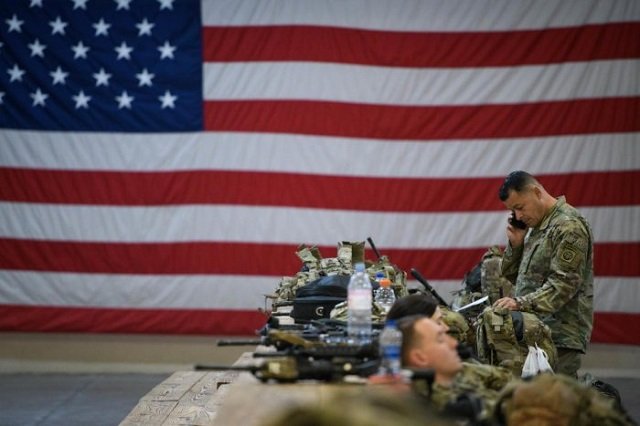
Seeking to tighten pressure on its arch foe, the United States meanwhile imposed more sanctions on Iran, responding to an attack on US troops in Iraq launched by Tehran in retaliation for the death of General Qassem Soleimani.
Iraq looks set to bear the brunt of any further violence between its neighbour Iran and the United States, its leaders caught in a bind as Washington and Tehran are also the Iraqi government's main allies and vie for influence there.
Prime Minister Adel Abdul Mahdi made his request in a phone call with US Secretary of State Mike Pompeo late Thursday in line with a vote by Iraq's parliament last week, his office said in a statement.
Abdul Mahdi asked Pompeo to "send delegates to put in place the tools to carry out the parliament's decision," it said, adding without elaborating that the forces used in the killing had entered Iraq or used its airspace without permission.
The US State Department said any US delegation would not discuss the withdrawal of US troops as their presence in Iraq was "appropriate." "There does, however, need to be a conversation between the US and Iraqi governments not just regarding security, but about our financial, economic, and diplomatic partnership," spokesperson Morgan Ortagus said in a statement.
The State Department later said Pompeo had discussed the possibility of an expanded Nato presence in Iraq in a call with his Canadian counterpart.
The latest flare-up in the long covert war between Iran and the United States began with the US killing of Soleimani, Iran's top general, in a drone strike on Jan 3.
Iran responded on Wednesday by firing missiles at US forces in Iraq. In the aftermath, both sides backed off from intensifying the conflict but the region remains tense, with Iranian commanders threatening more attacks. Iraq's top Shi'ite Muslim cleric on Friday condemned the US Iranian confrontation taking place on Iraqi soil, saying it risked plunging an already war-ravaged country and the wider Middle East into deeper conflict.
Grand Ayatollah Ali al-Sistani said it was Iraqis who stood to suffer most from the US Iranian conflict.
US imposes more sanctions on Iran for missile attacks on American targets
In a message delivered through a representative at Friday prayers in the holy city of Kerbala, Sistani said no foreign powers should be allowed to decide Iraq's fate
Calls to leave
"The latest dangerous aggressive acts, which are repeated violations of Iraqi sovereignty, are a part of the deteriorating situation" in the region, Sistani said, who wields huge influence over Iraqi public opinion.
"Iraq must govern itself and there must be no role for outsiders in its decision-making," Sistani said. Iraq has suffered decades of war, sanctions and sectarian conflict, including two US led invasions.
At Friday prayers in Tehran, mid-ranking Iranian cleric Mohammad Javad Haj Aliakbari said US interests across the world were now exposed to threat. Since Soleimani's killing, Tehran has stepped up its calls for US forces to leave Iraq, which like Iran is a mainly Shi'ite Muslim nation.
Iranian Supreme Leader Ali Khamenei has said the retaliatory strikes were not enough and that ending the US military presence in the region was Tehran's main goal.
Lives at risk
Trump, who is seeking re-election this year, told a rally in Ohio that Soleimani was killed because he had planned to blow up a US embassy. Trump offered no hard evidence of what drove the decision to kill Soleimani, which critics have called a reckless action.
Pompeo said on Friday Washington had specific information about an imminent Iranian threat including to US embassies, adding: "American lives were at risk." He said new sanctions, on manufacturing, textiles and mining, hit at the heart of Iran's security apparatus. A sanctioned commander of Iran's Revolutionary Guards, Mohsen Rezaie, wrote on Twitter that the new curbs were "symbolic ... and will not bring respect for Washington."
As part of his most recent activities in Iraq, Soleimani had encouraged pro-Iranian Iraqi militias to quash months of protests by Iraqis opposed to the influence in their country of foreign powers such as Iran and the United States.
In Iraqi cities, demonstrators took to the streets again on Friday, determined to keep up the momentum of their protests despite attention turning to the threat of a US Iran conflict.
Gunmen killed a local journalist who was covering protests in the southern city of Basra, security sources and state media said. Ahmed Abdulsamad was Basra correspondent of Dijla TV station, owned by senior Sunni politician Mohammed al-Karbouli.
“Politicians and clerics ... are either with Iran, the US or other countries. Our allegiance is to Iraq only, not to factions and politicians," said Essam Faraj, 54, a demonstrator in Baghdad.

1727177459-0/BeFunky-collage-(6)1727177459-0-165x106.webp)


1732694983-0/BeFunky-collage-(1)1732694983-0-165x106.webp)




1732687571-0/Untitled-design-(2)1732687571-0-270x192.webp)







COMMENTS (2)
Comments are moderated and generally will be posted if they are on-topic and not abusive.
For more information, please see our Comments FAQ